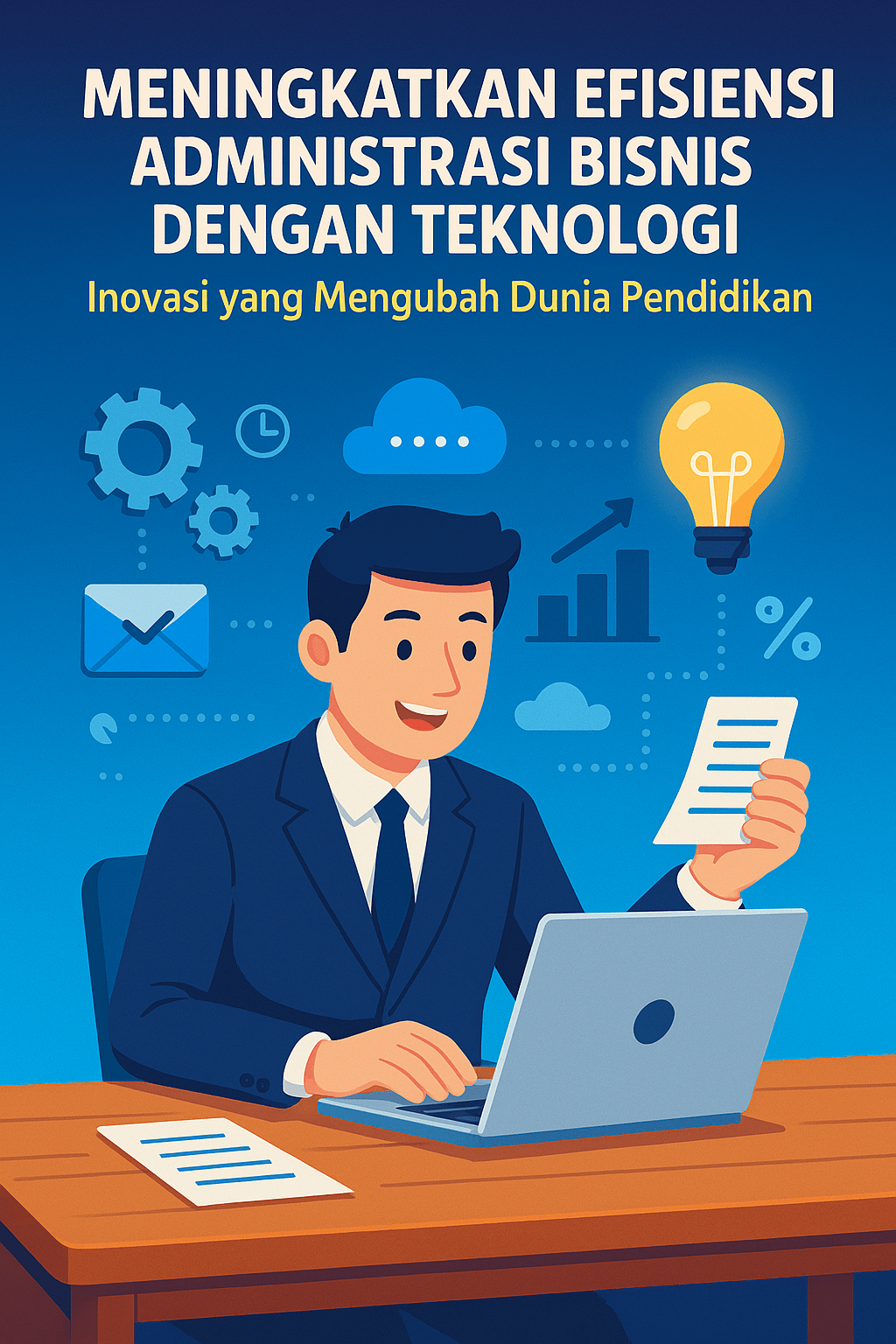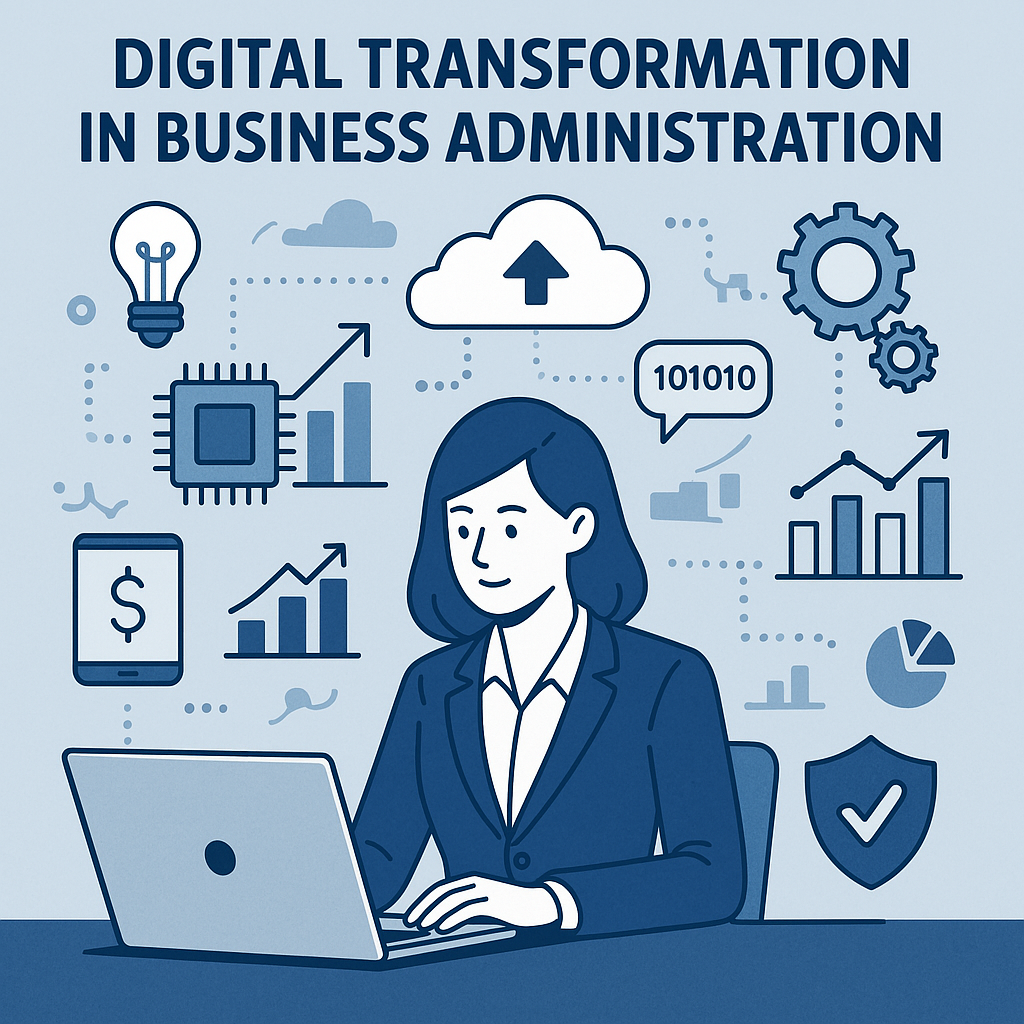
Improving Business Administration Efficiency with Technology: Innovations that are Changing the World of Education
In today’s digital era, almost all aspects of life are affected by technological developments. Including in the world of education, especially in the Bachelor of Business Administration at Telkom University. Technology is not just a tool to support daily activities, but also a key in improving efficiency, both in resource management, learning, and decision making. Proper utilization of technology can help students and teaching staff to achieve goals more quickly and effectively.
Digital Transformation in Business Administration

The application of technology in the field of business administration opens up great opportunities for universities to introduce more structured and efficient management and learning systems. Technology-based information management systems enable better data management, such as student data, class schedules, and financial administration management.
For example, the use of project management apps such as Trello or Asana helps students and faculty to monitor the progress of group assignments or projects in real-time. This not only saves time, but also reduces the possibility of administrative errors. By utilizing technology, the entire administrative process can be more easily controlled, efficient, and transparent.
Improving the Efficiency of the Learning Process
One of the main applications of technology in the Bachelor of Business Administration major is in the learning process. Technology gives students the opportunity to access learning materials anytime and anywhere. Online learning platforms such as Moodle, Google Classroom, or Microsoft Teams allow students to attend classes without having to be in a physical classroom. This is very efficient because students can learn at their own pace, access teaching materials, and discuss with classmates or lecturers in a virtual space.
In addition, technology enables simulation-based teaching and business applications that provide real-world experience without the need to be directly involved with the business or company. For example, students can use ERP (Enterprise Resource Planning) software that is often used in the industrial world to experience how the flow of business management is organized. This technology allows students to practice managing and planning company finances, inventory management, and marketing strategies more practically.
Utilization of Big Data and Analytics
One of the most influential technology tools in the business world is big data and analytics. In business administration, data is essential to help make informed decisions. With big data technology, students can learn how to collect, process, and analyze data to make more strategic decisions.
Business analytics systems allow students to understand consumer behavior patterns, market analysis, and the latest industry trends that can be used to formulate marketing policies or strategies. The use of tools such as Google Analytics, Tableau, or Excel allows for quick and efficient data processing, without having to perform time-consuming manual calculations.
More Effective Collaboration and Communication
Communication and collaboration are two very important aspects of business administration. Technology facilitates this by providing various platforms that support remote teamwork. For example, Google Drive or Dropbox allow students to easily share files and work together on the same document simultaneously. By using communication apps like Slack, students and lecturers can stay connected, share ideas, and provide feedback in less time.
In addition, technology enables collaboration between universities or even between countries. Students can engage in international projects, global group discussions, or other activities that support the exchange of knowledge and experience. That way, they not only gain local knowledge, but can also develop international insights that are invaluable in this increasingly globalized business world.
Automation in Administration
One of the most significant ways to improve efficiency in business administration is to automate repetitive tasks. For example, academic data processing, managing tuition payments, and recording student attendance can be done with automated software. This not only reduces administrative workload but also speeds up the process and minimizes the potential for human error.
The ERP system integrated with the academic management system allows administrative staff to manage student data, payment processes, and class schedule arrangements automatically. This technology allows administrative staff to focus on more strategic tasks and program development, while routine administrative tasks can be completed more efficiently.
Optimizing Marketing and Resource Management
In the world of business administration, marketing is one of the crucial aspects. Technology allows Telkom University’s Bachelor of Business Administration department to optimize marketing and resource management through various digital tools. By using digital marketing tools such as SEO (Search Engine Optimization), SEM (Search Engine Marketing), and social media, the department can attract more prospective students and increase its visibility online.
In addition, technology in the form of financial management tools is also very helpful. Software such as QuickBooks or Xero allows for more transparent and efficient management of budgets and expenses. Students can learn how to manage cash flow, prepare financial statements, and plan budgets better, which will be very useful when they work in the industry later.
Improved Student Services with Technology
Fast and efficient service to students is also critical to improving the quality of their experience. Technology allows for more personalized and faster student services. Online registration systems integrated with various platforms allow students to register for courses, access materials, or even take exams without having to come to campus.
A sophisticated academic management system allows students to view their transcripts, plan their class schedules, or even communicate directly with lecturers or administrative staff without geographical barriers. This is very convenient for students, especially those who have busy schedules or have difficulty coming to campus.
Technology has a huge role in improving efficiency in the Bachelor of Business Administration program at Telkom University. By utilizing various latest technologies, the learning process, data management, collaboration, and communication can be done more quickly, efficiently, and accurately. Students not only get a more in-depth hands-on experience of how the business world operates, but are also prepared to become professionals who are ready to face the challenges of an increasingly complex global industry.
Telkom University’s Business Administration Department that integrates technology in its education system will provide a competitive advantage for its graduates. They will have the skills needed to work in a fast-paced and digitally connected business world. Therefore, technology is not just a tool, but a very important element in shaping future generations of professionals.
Reference
Alvarez, M., & Molina, A. (2019). The impact of technology on higher education: A case study of administration in universities. International Journal of Educational Technology, 12(3), 123-135. https://doi.org/10.1016/j.educon.2019.04.004
Bennett, S., & Maton, K. (2020). Learning from Technology in Business Education: Enhancing Student Engagement and Learning Outcomes. Journal of Business Education, 45(2), 101-118.
Cheng, E. C. K., & Chan, E. T. K. (2021). Big Data and Decision Making in Business Education. Journal of Business Analytics, 11(4), 567-580. https://doi.org/10.1080/01446193.2021.1914823
Dixon, J., & Burgess, L. (2020). Digital Transformation in Higher Education: Exploring the Integration of Technology in Business Administration Courses. International Journal of Business Administration, 28(1), 101-120.
Ghani, S. A., & Hasan, M. K. (2022). Leveraging Technology for Business Education: Practical Insights and Case Studies. Business Education Journal, 36(5), 411-428. https://doi.org/10.1007/BEJ-10-2022
Martin, L., & Green, R. (2018). The Role of Technology in Enhancing Business Administration Education: A Review of Tools and Strategies. Business Education Quarterly, 49(3), 188-202.
Pappas, I. O., & Kourouthanassis, P. E. (2017). The Future of Business Education: Technology and Innovation. Journal of Educational Technology and Society, 20(2), 34-45. https://doi.org/10.2307/22822637
Thompson, L., & Agarwal, R. (2019). Technology Integration in Business Administration Programs: The Path to Efficiency and Success. Business Management Review, 39(2), 158-171.
Tags : S1 Administrasi Bisnis | Administrasi Bisnis | S1 Administrasi Bisnis Telkom University